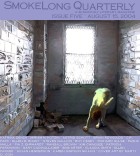Caitlin rests her stomach on the boogie board and concentrates on her breaststroke. She parts the water with cupped hands, propels herself forward through the dark blue pool. Her legs mermaid behind her.
She’s staying with her uncle for the month of July. He had polio when he was thirteen and uses a wheelchair. His house has ramps and rails, a low sink and counter in the kitchen, low sinks and high toilets in the bathrooms. After the accident, her mother thought he might set a good example for Caitlin. He lives in Shreveport, three hours away.
She’d been walking home from cheerleading practice, thinking about her boyfriend, Ryan, how they’d just screwed in the equipment room. He was a tackle on the football team. A freckled face and round brown eyes, two hundred and fifty pounds begging in the sweetest voice. On his knees, he held himself over her like a girl’s push-up, kissed her until his mouth twisted into a crooked O and he went somewhere that looked like pain. This was their second time that week.
She walked on the side of the road, kicking loose stones into the ditch. Her heart right before she said okay was like a ripe tomato.
Caitlin didn’t see the car, only heard the music on his radio – Tie Me Kangaroo Down, Sport – and the driver’s deep and jolly voice as he sang along. His front bumper clipped her from behind, knocking her in the ditch. Her pom poms were still strapped on her hands when the EMT’s gently lifted her on the stretcher. He didn’t stop. Denham Springs, the town she lives in, is small. The police wanted to question the Australians, but there are none.
The sun disappears behind the clouds and a cool breeze kicks up out of nowhere. Caitlin pulls herself out of the water, rolls over on her hip, the way her uncle showed her, and lies beside the pool.
He works in the rehab wing of the hospital helping people re-learn what they used to do without thinking. He drives to work in a specially prepared van and will be home for dinner at 5:30. In the evenings they watch TV. He tells her to ask him anything. Not to be embarrassed. He was angry, too, at first, blah blah blah.
Teddy, the neighbor’s son, comes through the fence door. He’s home, finally, from tennis practice and carries a rum and Coke in each hand. For the past two weeks he’s been stopping by.
“Hey, gimp,” he says.
“How’d you play?” Caitlin says.
“I won two out of three sets,” he says. Next year he’ll be a senior in high school. So will she. He’s short, tanned, with dark hair he doesn’t push out of his eyes.
“This tastes good,” she says, sipping her drink.
“Do anything new today?” he says.
“I swam to the bottom, looked around, practiced holding my breath. I want to shoot up like a rocket but my arms are weak.”
He stretches his out in front of him so she can see how much bigger his right forearm is than his left.
“Popeye the sailor man,” she says. The cloud is off the sun now and the sudden warmth gives her legs goose bumps she can’t feel.
“Give me the lotion,” Teddy says. He rubs Coppertone on her shoulders, her back, over her thin legs. There are four straight scars and he’s measured them with his knuckle. Two are four inches long, one is eight, one is 25. Her spine was broken but there’s no scar. His hands go both nowhere and everywhere in particular. She can’t ask her uncle what to do with the sex that’s in her brain.
She lowers herself into the water. Teddy strips off his shirt and jumps in, reaches for her so she can dolphin-ride on his back. “This isn’t Make-A-Wish,” Caitlin says. She goes under and pulls his shorts down with her teeth, nibbles him like a curious fish until her breath runs out.


 The core workshop of SmokeLong Fitness is all in writing, so you can take part from anywhere at anytime. We are excited about creating a supportive, consistent and structured environment for flash writers to work on their craft in a community. We are thrilled and proud to say that our workshop participants have won, placed, or been listed in every major flash competition. Community works.
The core workshop of SmokeLong Fitness is all in writing, so you can take part from anywhere at anytime. We are excited about creating a supportive, consistent and structured environment for flash writers to work on their craft in a community. We are thrilled and proud to say that our workshop participants have won, placed, or been listed in every major flash competition. Community works.